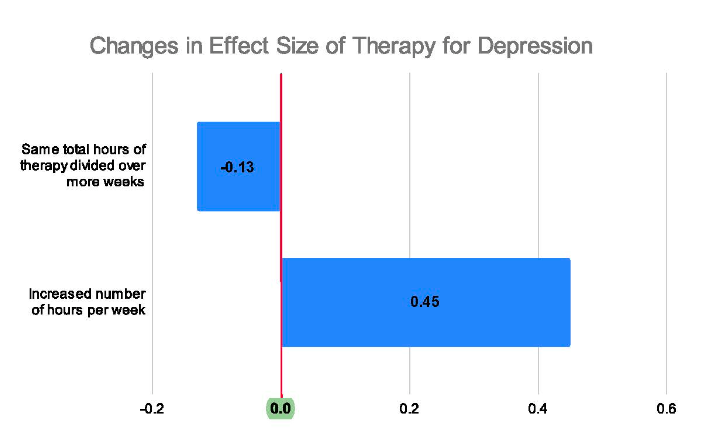Browse by category

Intensive Therapy: Research Brief
How Much Therapy is Needed to Treat Depression? A Metaregression Analysis
Journal of Affective Disorders, 2013
Depression is something that many people experience throughout their lives. There is a way to help people faster. Intensive therapy involves individualized longer and more frequent therapy sessions over a shorter period of time to increase effectiveness. In clinical practice, intensive therapy is often reserved for higher acuity situations, for which one hour per week of therapy is felt to be insufficient.
This study found that providing the same number of hours of therapy over a shorter period of time leads to a significant improvement in depression.
Treatment outcomes were actually worse as the same number of therapy hours were stretched out over a longer period of time.
These results suggest that intensive therapy is more effective and economical for the treatment of depression as compared with traditional once per week treatment.
Highlights from the Study
“...we examined the association between therapy duration (in weeks) and effect size. Unexpectedly, we found that a longer duration resulted in a lower effect size.” p. 8
“...we found that more sessions per week resulted in a considerably larger effect size than less sessions per week.” (p. 8)

At Feeling Good Institute, the intensive treatment program for depressive and anxiety disorders typically provides 10-24 hours of individually tailored therapy over the course of 3-14 days for individuals and couples seeking faster results.
Learn about the essential skills for effective cognitive behavior therapy and how we set therapists up for success.
Research Brief Author: Kevin Cornelius, M.A., LMFT
Citation: Cuijpers, P., Huibers, M., Ebert, D.D., Koole, S.L., Andersson, G. (2013). How much psychotherapy is needed to treat depression? A metaregression analysis. Journal of Affective Disorders, 149. https://pubmed.ncbi.nlm.nih.gov/23528438/